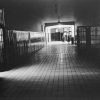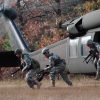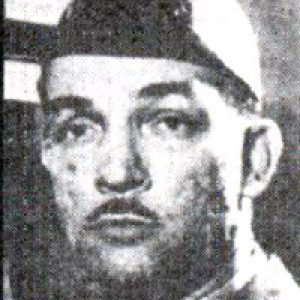calsfoundation@cals.org
John Howard Yancey (1918–1986)
John Howard Yancey was one of Arkansas’s most colorful war heroes. His actions in the South Pacific in World War II and the Korean War garnered him two Navy Crosses, a Silver Star, a Bronze Star, and three Purple Hearts. He was a champion of civil rights in the late 1950s and early 1960s in Arkansas.
John Yancey was born on April 27, 1918, in Plumerville (Conway County) to Mary and John Benjamin Yancey, who owned a gas station; his younger brother, John Benjamin Yancey Jr., became a Little Rock (Pulaski County) police officer. He attended what is now Ouachita Baptist University (OBU) but left college in 1942 to join the Marine Corps as World War II was beginning. After basic training in San Diego, California, he volunteered for an elite unit that was being formed. This group, which became known as Carlson’s Raiders, was in the forefront of the major U.S. offensive in the South Pacific. Yancey soon became Lieutenant Colonel Evans F. Carlson’s bodyguard.
In November 1942, Yancey and a handful of men on Guadalcanal, Solomon Islands, captured a strategic artillery placement during a night of hand-to-hand combat. He was awarded a battlefield commission to lieutenant, as well as his first Navy Cross. After the war, he was discharged to the Marine Reserves Rifle Company in Little Rock, where he married JoAnn Campbell in January of 1950. They began a family and operated a liquor store in Little Rock named Yancey’s. He was thirty-two when the Korean War began in 1950, and he volunteered to fight with the Marines. At Chosin Reservoir in North Korea, with the temperature thirty-five degrees below zero, Yancey found himself in command of a platoon. Despite more than ninety percent casualties, the platoon defended its position against 120,000 advancing Red Chinese, earning Yancey his second Navy Cross and a Silver Star for hand-to-hand combat that helped save two Marine regiments. He received many serious injuries and was recommended for the Medal of Honor, but as all of his superior officers were killed in the battle, there was no written report of his actions.
Back home, Yancey ran unsuccessfully for state senator in the 1960s, supporting integration and opposing Governor Orval Faubus. He won a lawsuit against Faubus to reapportion the state so voting would be racially balanced. His wife was on the Women’s Emergency Committee to Open Our Schools (WEC), which fought to keep Little Rock schools open during the desegregation crisis at Central High.
General Sidney McMath (governor of Arkansas from 1949 to 1953) suggested that Yancey become his executive officer in the Vietnam War when he was assigned to Vietnam, but the Marine Corps turned him down because of his previous injuries. Despite his tough image, he was a student of poetry and philosophy. Yancey was the model for the bronze bust of Count Pulaski—the Revolutionary war hero for whom the county is named—in the Pulaski County Courthouse.
Yancey died on May 16, 1986, and his close friend, General McMath, planned every detail of the funeral. Yancey is buried in Little Rock National Cemetery. A department of the Marine Corps League in Texas is named after Yancey.
For additional information:
Hammel, Eric. Chosin: Heroic Ordeal of the Korean War. Novato, CA: Presidio Press, 1990.
Wilson, Jim. Retreat, Hell! We’re Just Attacking in Another Direction. New York: William Morrow and Company, Inc., 1988.
Charles William Cunning
Biography Arkansas









As a young Litte Rock police officer, I had the honor of attending his services; his son, John, had retired from the department. I did not realize the type of warrior he was. I later had the privilege of meeting and working with Eugene Donham, who served at Chosin with him. Eugene told us the story and I could not imagine the bravery of these men.
I was sitting with my hero John Yancey at the Marine Corps ball in 1969 with Bob Bumgarder, Butch Walters, and the iron man from UCA–all Vietnam veterans. Mr. Yancey talked to us about his war time in World War II and Korea. We had a good time, and I read later the book On Desperate Grounds by Hampton Sides; all of the Korea stories were in the book. He was one man that deserved the Medal of Honor like Chesty. He told us, “You boys are not getting the credit you deserve being in a conflict where the public didn’t approve.” We are the redheaded stepchild still today.
Should be awarded the Medal of Honor. Amazing combat hero!
Captain Yancey is memorialized in two excellent books on the Korean conflict, Martin Russ’s Breakout and Joseph Goulden’s Korea: The Untold Story of the War. Both of these works go into some detail of then-Lt. Yancey’s exploits, but Russ’s book describes closest the ideals of what we can learn from the great one’s example. His biggest contribution was his irascible insistence on bravery and kindness to his men. He could lose his temper like anyone, but one gets the feeling that USMC was a credo above mundane life, that a young Marine could get through the worst with a leader like Yancey. I wish I knew him. His bravery is not available to everyone. It is almost metaphysical, akin to the mythic Norse sagas and things beyond just serving in the military to retire with a great pension. Yancey seemed to embody the attitude that he often shouted to rouse his men, “You don’t to live forever, do you?” I know a fractional bit of what Yancey faced in trying to lead young men, old men, Marines, into battle. What I will never know is where he got such nerve, real courage and intelligence, to do so. Who is stepping into Yancey’s shadow today? I, like most Americans, have to rely on young men to step into the “stuff” for us and reach down deep for those things Yancey wore like his uniform every day. I wish that the CMoH would have reached him when he was alive and understand the reasons that it has not. He was truly in a company of heroes, and medals just don’t seem enough, somehow. I will keep John Yancey in my thoughts when I need someone to remember when the going gets tough. A living memorial isn’t bad, is it?
From a brother Marine–Korea: John Yancey represented what was, and I hope still is, the best of the Marine Corps. He was the real deal in a way that you had to be there to know.